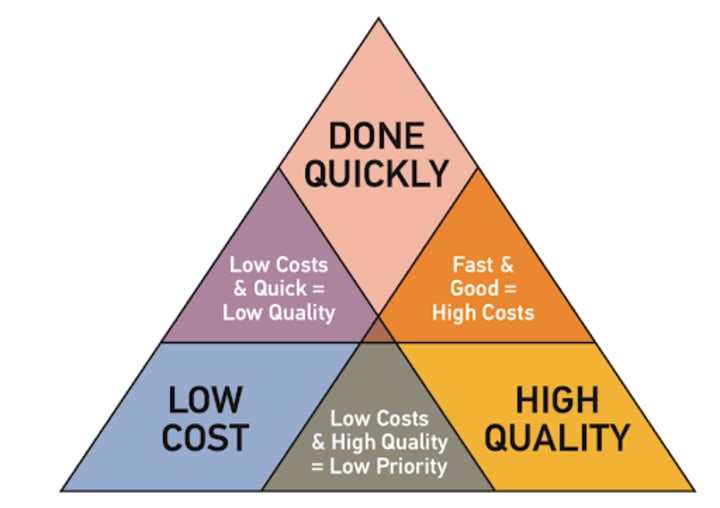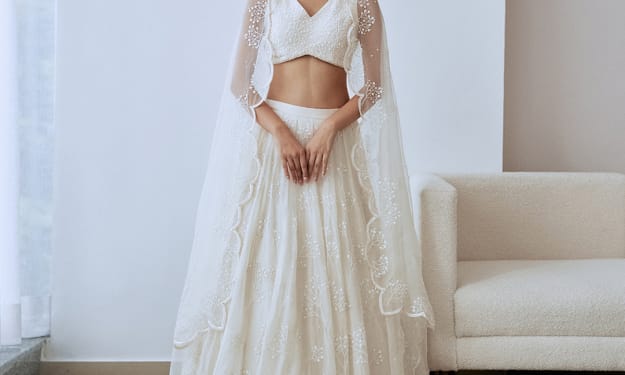Why Buying 100% Ethical clothing might not be sustainable
To replace your wardrobe, or not.

I've heard a lot of arguments recently about the ethical clothing trend. I say trend only because I feel like the last two years this has been a HOT topic, at least in the communities I run in.
The word Ethical means having integrity, high moral principles, and being fair in your business practices. In the case of clothing companies, this would mean that workers are compensated fairly and have a livable wage and that the working environment is safe and clean.
With a lot of companies we all buy from every day, this is not the case.
Fast vs. Slow fashion
A $5 shirt can be made very quickly, whereas a $50 shirt takes time.
The chart below is typically used in terms of construction, artwork, or any job you need to be done by a qualified person. If you want a piece of artwork to have high quality and be done quickly, that is gonna cost you a lot. If you want a house built for cheap and to be done quickly, it will be poorly constructed of very bare-bones basic.
Clothing is the same way.
The speed and low cost of most clothing often mean the quality is poor, and that the product won't last very long.
With most high-cost ethical clothing, you can count on the quality of the product.

Benefits of shopping Ethically
When you shop ethically, your clothing comes from a good source, and people are treated fairly. No matter how you shop, you are casting your vote on what kind of world we should live in.
The quality of your clothing is also a BIG benefit.
How long will that shirt last, and how many times will you wear it?
One of the advantages of shopping ethically is that the quality of the clothing is generally a lot better than that of say, Wal-Mart.

Ethical clothing companies are known for their beautiful, high-quality pieces made in factories or by small companies that pay a fair wage, and use ethical practices with their employees.
These companies take care of their workers and never use sweatshops to make their products.
Because of this, the product quality is much better. Pieces don't fade easily, don't wear out after 10 uses, and feel comfortable longer.
The Downside to Shopping Ethically
It's super expensive.
At least in the short term.
The $5 tank top you buy at Target or Walmart might last you a couple of years. The $35 tank top you buy from an Ethical clothing site will probably last you closer to 10 years.
Sometimes though, companies that use the ethical + sustainable terminology are hiking prices just because they know they can.
I have seen a single tank top priced at over $100 on some ethical clothing sites.
In my own opinion, that is absurd. There are a lot of better things you could spend $100 on. For me, one of those things is groceries.
With prices that high, only wealthy people are able to afford to shop ethically. Those who want to shop ethically either cannot afford to do so or can only afford to have a few ethical items in their wardrobes.
I don't know about you, but I don't want to have to save up extra money to be able to afford a solid white t-shirt. There is also no way I can save up money to buy my son's clothing because by the time I've saved up, he'll need the next size up.
It doesn't make logical sense when you have a family or live on one income to shop solely ethically, especially with clothing.
Living Intentionally vs. Living Ethically
Believe it or not, there is a difference.
I hadn't thought about this until I watched this video by Rachel from Ivory + Ebony blog on YouTube. She is a wife and mother of 3 who works from home, and had tried living completely sustainable and ethically.
She discovered that she was spending so much money shopping ethically that they were kind of getting into debt because of it. Which in turn, ended up not being a sustainable lifestyle for her and her young family.
Living more intentionally might mean making some sacrifices when it comes to ethical living, and just buying your kids the $5 t-shirt at Target because they will outgrow it in a month anyway. And then, handing that t-shirt down to the next child or donating it so that someone else gets some good use out of it as well.
In this video, Rachel talks about the difference between ethical living and intentional living. I highly recommend giving it a watch!
Thrifting may be an answer to the problem.
Thrifting has gotten a bad reputation. There is a stigma that says only people who can't afford to shop at "normal" stores shop thrift. But really, there are a lot of great finds that can come from thrift stores.
I have bought some of my most used pieces from thrift stores!
And sometimes, people wear an article of clothing once or twice a year and donate it once they've decided it's not their style anymore. That is a practically new piece of clothing at less than half the price.

Shopping thrift can also be fun!
The items you find in a small boutique or thrift store are likely to be different than what you find in megastores or shopping malls.
These items give some extra flair and help you find your own style rather than wearing what everyone else is currently wearing.
Slowly acquiring an Ethical Wardrobe
Another answer is to shop slow fashion slowly.
Viewing these higher ticket sustainable pieces as an investment is the best way to look at it. And investments take time. When you purchase a house, you take time fixing it up, right? I know that we didn't (and still don't) have everything we wanted to fix up our house right after we bought it. We took our time buying paint, getting fixtures, fixing up the garage, etc.
An ethical wardrobe should work the same way.
Add one piece at a time, and find which companies you love supporting.
If you do want to try your hand at Ethical shopping, here are a few Ethical businesses that support some really great causes, from helping the environment to supporting pregnant mothers and women's educational rights.
If you are going to shop ethically, giving some of the proceeds to help a good cause is always a good thing too.
Thank you for reading this article, I hope it gave you some insight into the world of clothing and ethical shopping, as well as maybe gave you some peace of mind if you ever experience shoppers guilt when you can't shop solely ethically.
_________________
If you loved this article, read this next:
Thank you so much for reading! If you liked this article, be sure to click the heart button. If you really liked this article, tips are greatly appreciated! You can find more articles from me here on my Vocal profile.
-Leah H.
About the Creator
Leah Harris
Writer, blogger and artist. Inspirations for writing are Markus Zusak and Tyler Knott Gregson. Follow me on Instagram! @LeahNaturally






Comments
There are no comments for this story
Be the first to respond and start the conversation.